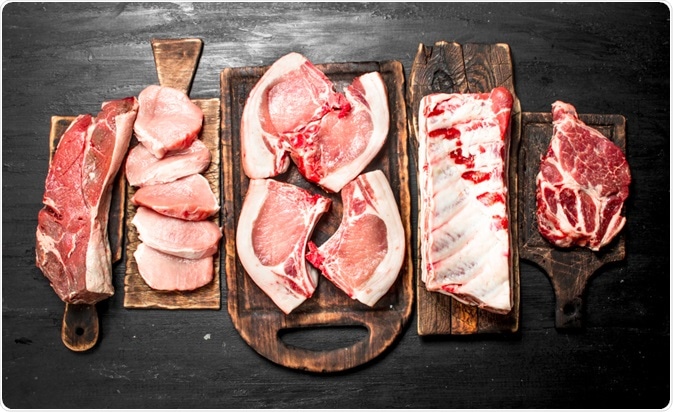The World Health Organisation (WHO) and several national dietary advice bodies around the world have recently recommended a reduction in the consumption of red and processed meats, based on consistent evidence that links highly processed meat with colorectal cancer in particular.
While there is a body of evidence that suggests the association between red meat consumption, there is a paucity of evidence to link the intake of poultry meat and the incidence of major non-cancerous health outcomes.

Image Credit: Chatham172/Shutterstock.com
Beyond red meat and colorectal cancer: New associations between poultry and a range of diseases
More recent findings from a study using 474,985 middle-aged adults recruited to the UK Biobank study between 2006 and 2010 have analyzed meat consumption more widely, and its association with 25 common conditions. this recent study is important as it examines associations of meat intake with conditions other than the commonly cited colorectal cancer.
These findings, which were published in BMC Medicine, found that on average, participants reporting regular consumption of meat (defined as three or more times per week) experienced more adverse health consequences compared to those who consumed meat less regularly.
In addition, higher consumption of unprocessed red, and processed red meat was associated with a higher risk of ischemic heart disease, pneumonia, diabetes, diverticular disease, and colon polyps.
Higher consumption of unprocessed red meat alone was associated with a lower risk of iron deficiency amenia, however. With regards to poultry meat, participants had higher risks of gastroesophageal reflux disease, diverticular disease, gastritis and duodenitis, gall bladder disease, diabetes. As seen with unprocessed red meat alone the consumption of poultry also lowered the risk of iron deficiency anemia.
Quantifying risk of disease
In quantitative terms, the study found that every 70 g of unprocessed red meat and processed red meat consumed daily increased the risk of heart disease by 15% and diabetes by 30% after accounting for other lifestyle factors such as alcohol consumption, physical activity, and BMI.
The risk of developing gastroesophageal reflux was increased by 17% and diabetes by 14% as a result of consuming poultry meat. Moreover, meat-eaters were predominantly overweight or obese, or high risk of developing overweight or obese. Consideration of the participants' BMI attenuated the risk of these diseases.
Further research is needed to determine whether the differences in risk observed reflected a causal relationship and if present, the extent to which these diseases could be prevented by lowering meat consumption. Public Health England has recommended a reduction of 20g in the consumption of red or processed meat a day to 70g.
The biological basis of meat and disease development
The speculative mechanistic hypotheses that link the increase in the risk of cancer development to the consumption of meat relate to lipid peroxidation and the formation of mutagenic compounds when cooking.
Red meat contains nitrates which result in increased levels of DNA adducts presumed to be derived from N-nitroso-compounds (NOC). Indeed, consuming well-cooked red meat has been shown to increase the bacterial mutagenicity of human urine in several studies.
Meat has also been shown to increase levels of oxidation; the consumption of red meat is moderately associated with changes in oxidative stress markers, with increased fecal and urinary lipid oxidation products found in rodent studies.
Moreover, heterocyclic aromatic amines (HAA) and polycyclic aromatic hydrocarbons (PAH), which are produced when meat is heated at high temperatures are thought to cause DNA damage; however little evidence exists to support this effect occurring following meat consumption.
Ultimately, a healthy balanced diet that features lean meats such as lean beef and chicken can mitigate the effects of excessive consumption of red meat. Meat can be a highly bioavailable source of micronutrients and essential amino acids, but In the UK, the National Health Service (NHS) recommends that consumers opt for the leanest cuts of meat, and limit the consumption of processed meats such as salami, beef burgers, sausages, and pate as they are typically higher in saturated fats and salt.
While red meat has high quantities of protein which promotes muscle growth and vitamin B12 and iron for the synthesis of red blood cells, alternatives can provide a similar health benefit. Poultry, fish, eggs, and nuts, can also offer essential micro-and macro- nutrients without increasing the risk of several diseases.
References:
- Papier K, Fensom GK, Knuppel A. et al. (2021) Meat consumption and risk of 25 common conditions: outcome-wide analyses in 475,000 men and women in the UK Biobank study. BMC Med. https://doi.org/10.1186/s12916-021-01922-9.
- Marie-Christine Boutron-Ruault, Sylvie Mesrine, Fabrice Pierre. 12 - Meat Consumption and Health Outcomes. In: François Mariotti (Ed.) Vegetarian and Plant-Based Diets in Health and Disease Prevention. 2017. Academic Press. pp. 97-214.
- U.S. Department of Health and Human Services Dietary Guidelines for American (2015) http://health.gov/dietaryguidelines/2015.asp (Last accessed October 2021)
- McAfee AJ, McSorley EM, Cuskelly GJ, et al. (2010) Red meat consumption: an overview of the risks and benefits. Meat Sci. doi:10.1016/j.meatsci.2009.08.029.
- NHS. Meat in your diet. https://www.nhs.uk/live-well/eat-well/meat-nutrition/ (Last accessed October 2021)
Further Reading
Last Updated: Nov 17, 2021